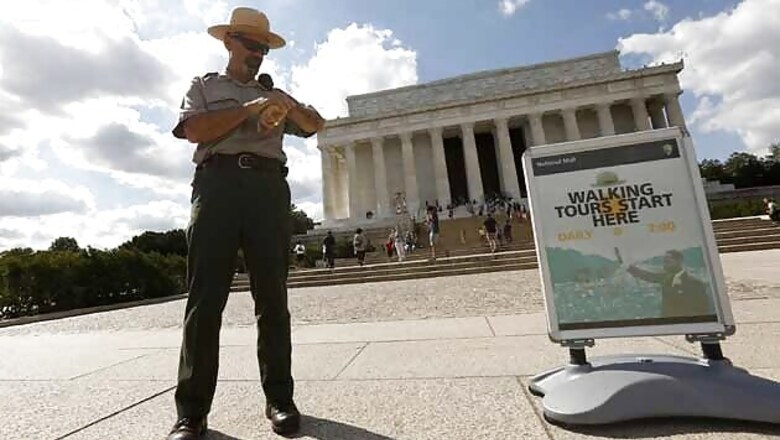
views
Washington: As many as a million government employees were making urgent plans on Monday for a possible midnight shutdown, with their unions urging Congress to strike a last-minute deal.
To avoid sending hundreds of thousands of workers across the country home without pay, lawmakers must act within hours, but it was unclear if an agreement could be reached in time.
On the streets of Washington at midday, federal worker Gary Peyton Hardaway, 30, said he faced possible furlough, but that he was "optimistic" a deal could be reached.
If not, he predicted a shutdown would be short in duration. "At that point, pretty much Congress and the whole world will realize how serious it is," Hardaway said.
If Congress fails to approve a spending bill before Tuesday, between 800,000 and 1 million government workers will be forced to take unpaid time off.
Only "essential" personnel at national parks, federal courthouses, food stamp programs, passport offices and other agencies funded by congressional appropriations would keep working until the government is authorized to spend money again.
Nearly 2.8 million people were employed by the federal government as of September 2012, according to the US Office of Personnel Management. Not all, however, are at agencies that would be affected by a shutdown.
The American Federation of Government Employees, the largest federal employee union, estimated half its 6,70,000 members would be furloughed, while the other half, deemed essential, would work, but not get paid until after a deal is reached.
"Half will be told to stay home without pay, half will be told to come to work without pay," spokesman Tim Kauffman said.
If there is a shutdown, union leaders said, they would pressure Congress to ensure that furloughed federal employees are also paid after the fact. Congress would have to authorize such payments, as it did for workers affected by the last government shutdown in late 1995 and early 1996.
"The National Treasury Employees Union will be leading the fight to make that happen," the union's president, Colleen Kelley, said, adding that 90 per cent of the workforce it represented at the Internal Revenue Service was facing furlough.
In a shutdown, taxes would not be collected; audits would not be done; and a skeleton crew at the IRS would not be providing taxpayer guidance, Kelley said.
IRS workers have already had to take off three unpaid days from work since May due to the automatic budget cuts known as the sequester. "The non-stop questions about the future are something that is very disheartening to longtime federal employees, they're tired," Kelley said.
The American Federation of Government Employees had conference calls set for Monday night to answer questions from members about what to expect if furloughed. An online campaign encourages members to call lawmakers, write letters to the editor and organize picket lines in their cities.
A 43-year-old IRS worker facing furlough, who asked not to be identified due to the nature of his work, said his office was "completely distracted" by the looming shutdown.
"I'm mostly sorry for the state of our government," he said. "It's an embarrassment for the country that the government can't get simple things done."




















Comments
0 comment